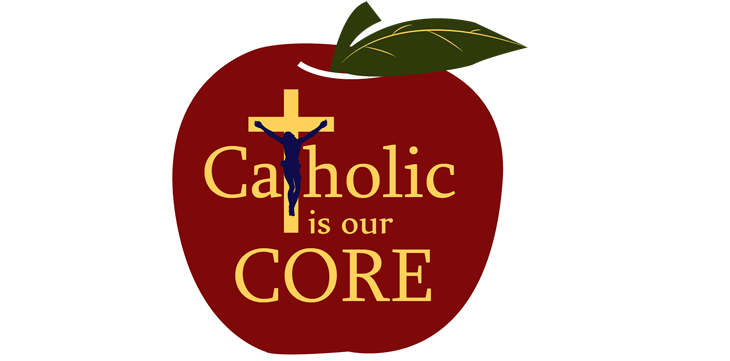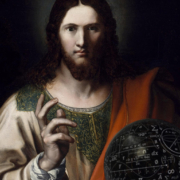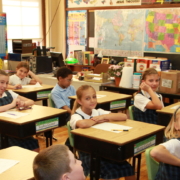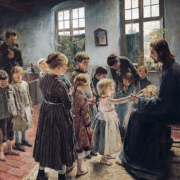New Catholic Curriculum Standards Put Focus on Faith
Catholic education experts are hailing The Cardinal Newman Society’s new Catholic Curriculum Standards as a “splendid” and “invaluable” new resource to help Catholic schools focus on their mission.
With the help of leading Catholic scholars like Jesuit Father Robert Spitzer, Anthony Esolen and Joseph Pearce, the Newman Society’s Dr. Denise Donohue and Dr. Dan Guernsey have produced a new tool to help families and teachers regain their focus on what matters most in Catholic education.
Amid growing discontent with the Common Core State Standards, these truly Catholic standards go to the heart of what students should be learning in a faithfully Catholic education from kindergarten through high school.
The standards cover English language arts, math, science and history, and they complement the U.S. bishops’ and diocesan standards for religious instruction. Each academic discipline’s standards are broadly grouped into two grade levels, K-6 and 7-12. They express outcomes according to which learning should be measured, with the goal of leading educators to assign or develop materials and choose subject matter that truly serve the mission of Catholic education.
Praise from Educators
A couple of dioceses are already working with the standards, which have received strong approval.
“Since, in every school, the curriculum carries the mission, these Catholic Curricular Standards are an invaluable contribution to Catholic schools everywhere,” said Fr. John Belmonte, S.J., superintendent of Catholic schools in the Diocese of Joliet and a national expert in Catholic school administration.
“Catholic schools have benefited from the standards-based reform movement in education with one notable exception: the absence of rigorous standards rooted and grounded in our Catholic tradition,” said Fr. Belmonte. “Implementation of the Catholic Curricular Standards will provide a renewed sense of mission for our Catholic schools operating within the increasingly secularized world of education today.”
“A splendid achievement,” said Dr. Ryan Topping, author of The Case for Catholic Education and a fellow at Thomas More College of Liberal Arts in Merrimack, New Hampshire. “Amidst widespread confusion about the nature and aims of the curriculum, these K-12 standards off educators structured guidance on how to deliver a robust Catholic intellectual formation.”
Dr. Sandra Stotsky, developer of the highly respected Massachusetts Academic Standards, said the Catholic Curriculum Standards “reflect more than the uniqueness of their intellectual tradition. They also provide the academic rigor missing in most public school English language arts curricula.”
For parents and educators seeking more practical assistance, the Catholic Curriculum Standards are accompanied by lists of recommended resources and even suggested literature for Catholic students at different grade levels.
The Cardinal Newman Society developed the standards with adaptability in mind. Educators are invited to amend and fit them into their own standards and curriculum guides to focus on the complete formation of students in the rich, Catholic intellectual heritage. We also anticipate developing practical tools to help educators work toward the standards in their classrooms.
Serving a Need
Today, many parents rightfully ask why Catholic schools often appear similar to public schools. Beyond religion class, the textbooks, reading assignments and even discussions of sensitive topics can seem very secular in many Catholic schools.
Have you ever wondered if there is a Catholic approach to teaching science? If you attended Catholic school decades ago, you’d have no doubt that there is such a thing. But today, many parents and students lack appreciation for what is special about a faithful Catholic education.
On topics like creation, nature, reproduction, behavior, scientific method, environment and technology, does Catholic education have something more important to teach than facts and figures?
What about literature? Good Catholic educators reject the Common Core’s emphasis on technical reading, preferring to instead focus on great literature — the epic tales, classical plays, poetry, biographies, persuasive essays and more that spark wonder, imagination and reasoning in young minds. Such literature prepares them to transform culture and renew it in the light of Christ.
And history! Too long has textbook history been dominated by Protestant distortions and emphases. A true grounding in history couldn’t be more important for young Catholics today: Christianity’s role in Western civilization, the rise of Islam, the glories of the Middle Ages, America’s founding principles and so much more.
The sad truth, however, is that many Catholic schools have looked to public school standards as measures of success in education. The defective Common Core and other government standards are secular and oriented to college and career. If Catholic educators measure success by these standards, they lose sight of their mission to evangelize and form young people in mind, body and spirit.
Renewed Purpose
The Cardinal Newman Society anchored its Catholic Curriculum Standards on principles of Catholic identity in education:
- Involves the integral formation of the whole person—body, mind and spirit—in light of the individual’s ultimate end and the good of society.
- Seeks to know and understand objective reality, including transcendent Truth, which is knowable by reason and faith and finds its origin, unity and end in God.
- Promotes human virtues and the dignity of the human person, as created in the image and likeness of God and modeled on the person of Jesus Christ.
- Encourages a synthesis of faith, life and culture.
- Develops a Catholic worldview and enables a deeper incorporation of the student into the heart of the Catholic Church.
These elements of Catholic education are quite different from the philosophy and objectives that drive secular education. As Drs. Guernsey and Donohue explain in their introduction to the standards:
The mission and goals of Catholic education are significantly different from the college and career goals that guide public schools. Because the mission of a school should guide its choice of standards, the unique and broader mission of Catholic education requires additional, and foundational, standards that include specific Catholic modes of intellectual reasoning as well as accompanying dispositions.
While Catholic education has many similarities to secular education, “Catholic education is uniquely positioned to offer guidance on issues of values and morality as well as to provide life-giving and definitive answers related to questions of human purpose, human dignity, and human flourishing.”
Designed for Change
It is our own mission at The Cardinal Newman Society to help restore excitement among educators and Catholic families about the great value of faithful Catholic education. This requires agreement about what makes Catholic learning unique and … well, “Catholic.”
We believe that our new Catholic Curriculum Standards can be pivotal in the renewal of Catholic elementary and secondary education. Diocesan school leaders, independent educators and homeschoolers alike can make use of them — and even modify and improve them — to ensure an emphasis on student formation that is largely missing from modern evaluations of school success.
Of course, ours is not the only effort toward improved Catholic education. Many dioceses have done important work toward refocusing classroom instruction, and our standards rely heavily on the conceptual work of many experts in Catholic education.
But that’s precisely why we believe that our Catholic Curriculum Standards will have such a tremendous impact. We worked with more than a dozen leading Catholic scholars to develop the standards, and we even had the great honor of working with Dr. Stotsky. Several Catholic school leaders also provided valuable input.
The standards were composed using research from Church documents, the educational philosophies of Newman Guide colleges, and many books and articles on Catholic education, liberal arts education and classical education.
The time is ripe for the Catholic Curriculum Standards. Thanks in part to the Newman Society’s steady drumbeat for 23 years, calling for renewed attention to Catholic identity — but even more because of the leadership of Saint Pope John Paul II and Pope Benedict in urging reforms, and the quiet work of many bishops and school leaders — we find much eagerness among Catholic families and educators for serious improvement.



 St. Agnes School, St. Paul, MN
St. Agnes School, St. Paul, MN

